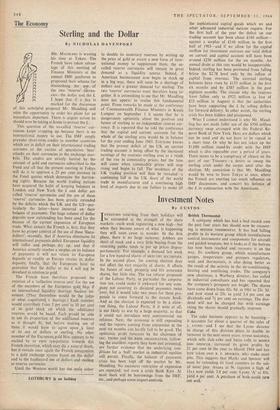Investment Notes
By CUSTOS
TNVESTORS returning from their holidays will be astounded at the strength of the share markets—each week registering a new high—but when they become aware of what is happening they will soon cease to wonder. In the first place, there is no large turnover. Jobbers are short of stock and a very little buying from the returning public tends to put up prices dispro- portionately. For example, a demand last week for a few hundred shares of MERCURY SECURITIES. In the second place, the coming election does not affect the vast majority of shares. It affects the future of steel, property and life assurance shares, but little else. The tax reform proposals of the Labour Party, in particular the corpora- tion tax, could make it awkward for any com- pany not covering its dividend payments twice over, but it would take two years for these pro- posals to come forward to the statute book. -And as the election is expected to be a close- run' thing, the. Labour Party, if it wins at all, is not likely to win by a large majority, so that it could not introduce very controversial tax reforms. Next, the economy is still expanding and the reports coming from companies in the next six months can hardly fail to be good. The optimistic profit forecasts by the chairmen of GEC. THORN and the RANK ORGANISATION, follow- ing the excellent reports they have just presented, are further evidence that the underlying con- ditions for a 'bull' market in industrial equities still persist. Finally, the balance of payments crisis has been kept off the market by Mr. Maudling. No measures restrictive of expansion are expected; not even a crisis Bank Rate. At most there will be borrowings from the IMF, etc., and perhaps some import controls.
• British Thermostat
A company which has had a bad record over the past four years but should now be recover- ing is BRITISH THERMOSTAT. It has had falling profits in its western group which manufactures control instruments and components for aircraft and guided weapons, but it looks as if the bottom has now been reached and recovery is on the way. Its southern group, which manufactures gauges, temperature and pressure regulators, seals and thermostats, is also doing better as the result of the activity in the air-conditioning, heating and ventilating trades. The company's new chairman, a Warburg director, has called in industrial consultants and has reported that the company's prospects are bright. The shares have come down from 42s. 9d. in 1961 to 22s. 3d. and now stand at 25s. to yield 5.4 per cent on dividends and 71 per cent on earnings. The divi- dend will not be changed but with earnings rising the shares should gradually improve.
Cake
The cake business appears to be booming— it accounts for about a quarter of the sales of 3. LYONS—and I see that the Lyons director in charge of this division plans to double its turnover in the next seven years. AVANA BAKERIES, which sells slab cake and Swiss rolls to MARKS AND SPENCER, increased its gross profits by 21 per cent in the year to March 1964 and has now taken over R. F. BROOKES, who make meat pies. This suggests that Marks and Spencer will soon be extending its food counters to the sale of meat pies. Avana at 9s. (against a high of I Is.) now yields 3.8 per cent. Lyons 'A' at 85s. yield 4 per cent. A purchase of both could turn out well.






























 Previous page
Previous page